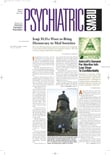Growing older might take the edge off of panic, a study reported in the February American Journal of Geriatric Psychiatry suggests.
The study was headed by Javaid Sheikh, M.D., a professor of psychiatry and an associate dean for veterans affairs at Stanford University School of Medicine.
Although many studies have focused on panic disorder in younger people, not much attention has been paid to the disorder in older people. Thus Sheikh and his coworkers decided to explore the effects of aging on panic disorder in some preliminary studies, and when their findings suggested that aging does have an effect, they went on to conduct a larger study on the subject.
For this study, they selected as their subjects 167 adults 20 to 83 years of age who had been diagnosed with panic disorder according to either DSM-III-R or DSM-IV criteria and who had volunteered to participate in a treatment trial for panic disorder. They used a number of instruments, including the Structured Clinical Interview for DSM-III-R-Patient Edition, Beck Anxiety Inventory, Body-Sensations Questionnaire, and Stanford Panic Appraisal Inventory, to assess the clinical status of their subjects before their subjects were randomized for panic disorder treatment. They then divided their subjects into those who were older than 60 years (74 subjects) and those younger than 60 years of age (93 subjects) and compared the clinical status of the two groups.
The researchers found no major differences between the two groups regarding gender, race, marital status, or psychiatric disorder comorbidity. However, they did find that older subjects reported, to a highly significant degree, less anxiety, fewer panic symptoms, and less-severe panic disorder than the younger subjects.
“These findings,” the researchers wrote in their study report, “extend our initial studies by demonstrating that panic disorder tends to decline in overall severity as patients advance in age.”
The investigators speculated that panic disorder might be less severe in older persons than in younger ones because older people’s fear circuitry is less reactive than that of younger people. Another possible explanation is that older people, having lived longer, may have a better idea of how to handle stressful situations.
If panic disorder is truly less severe in older people than in younger ones, it also raises the question of whether older persons with the disorder should receive the same treatment that younger persons with the disorder receive. As the researchers proposed in their study report, “Pharmacological interventions may be preferable as first-line treatments in younger patients (who typically report more somatic distress), whereas cognitive-behavioral interventions might be preferable as first-line treatments for older patients.”
Am J Geriatr Psychiatry 2004 12 102
